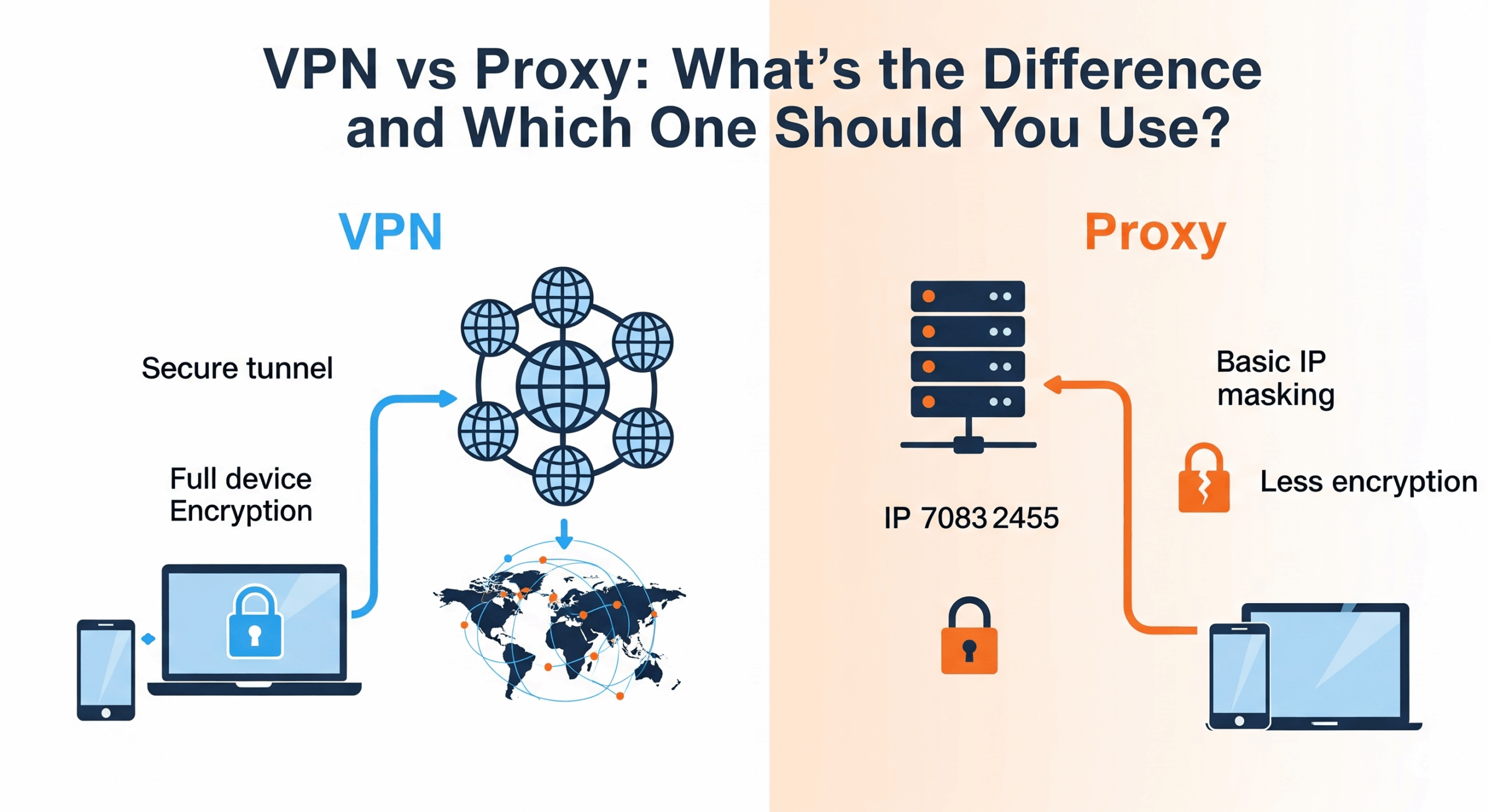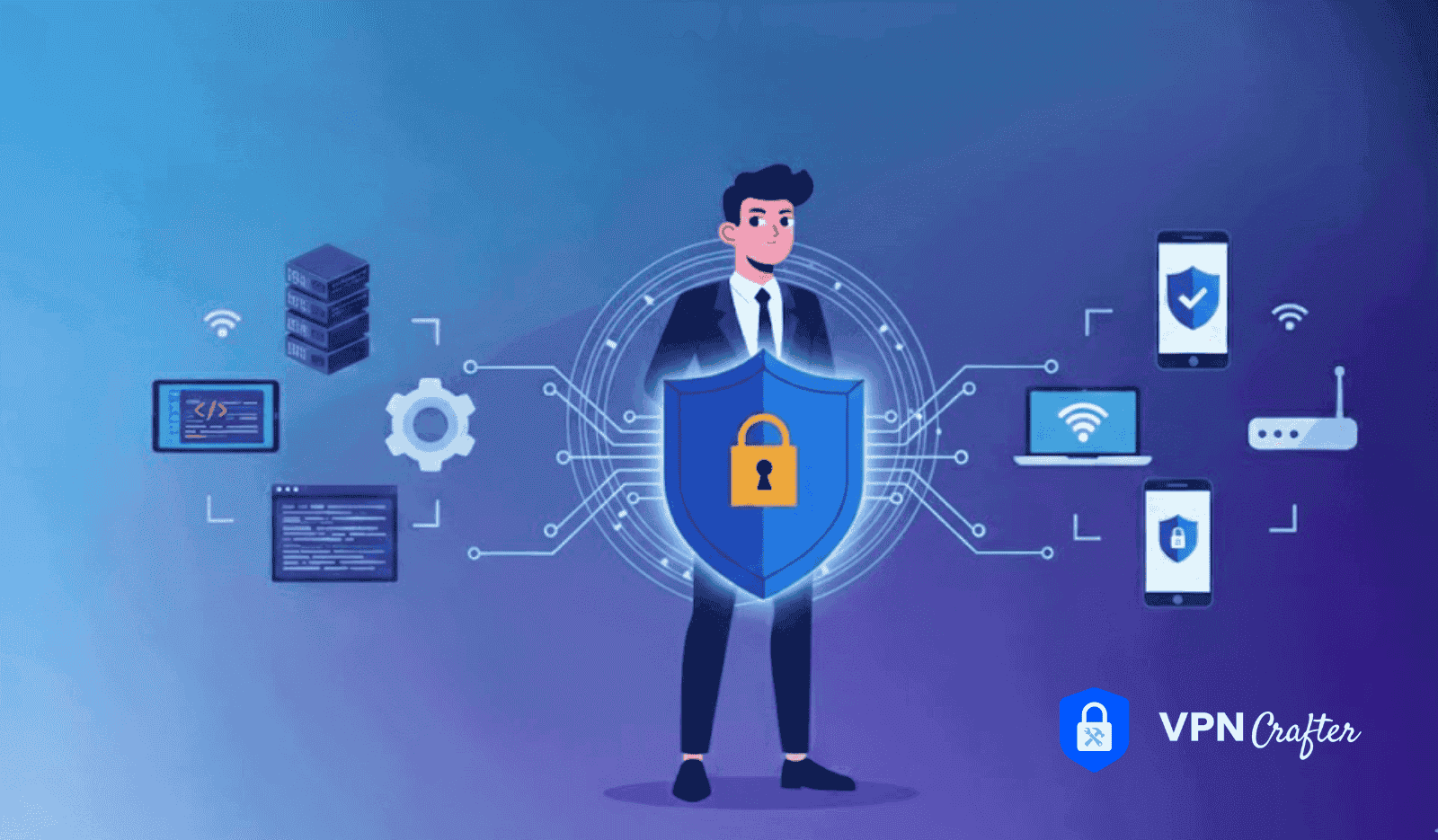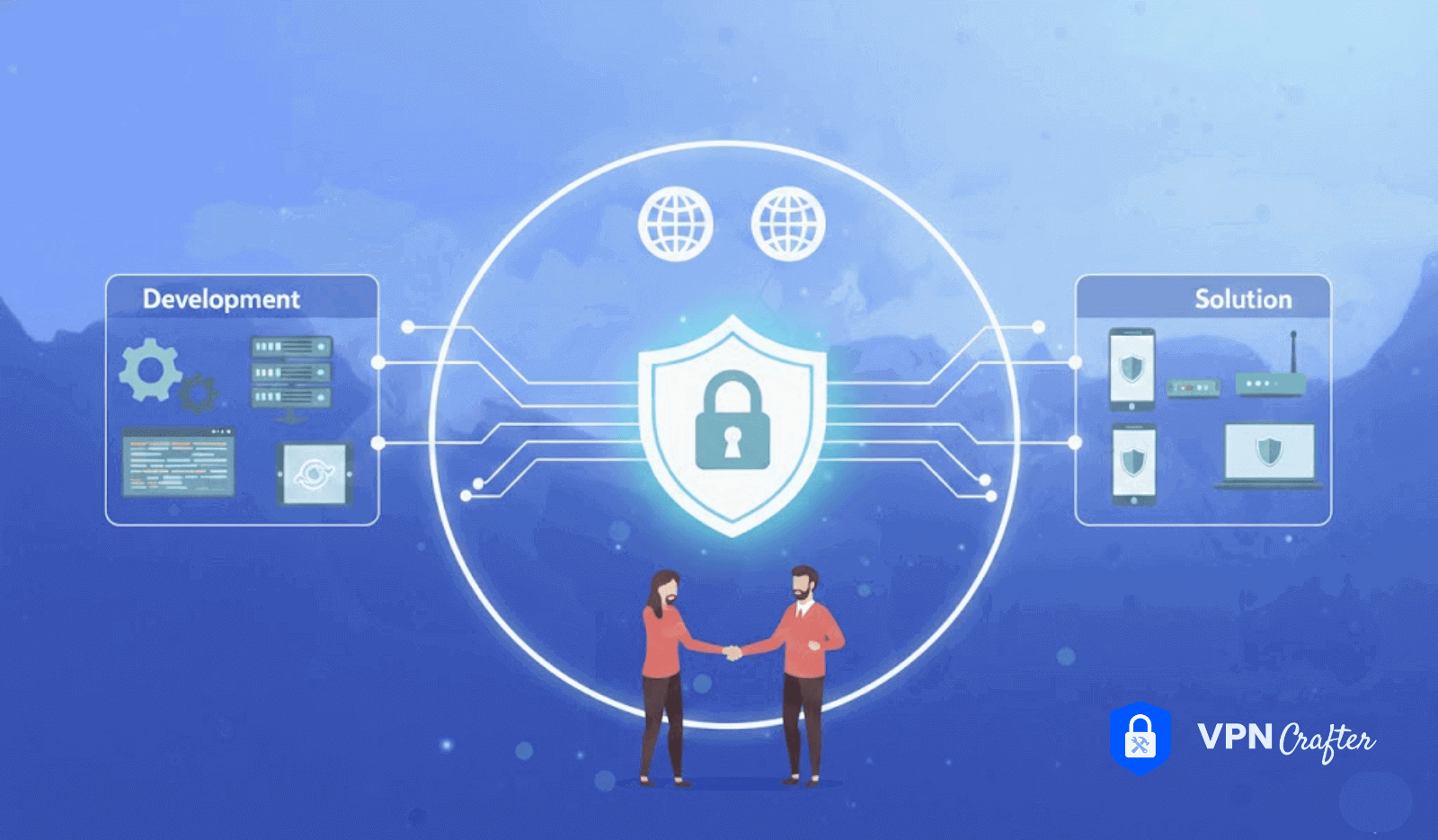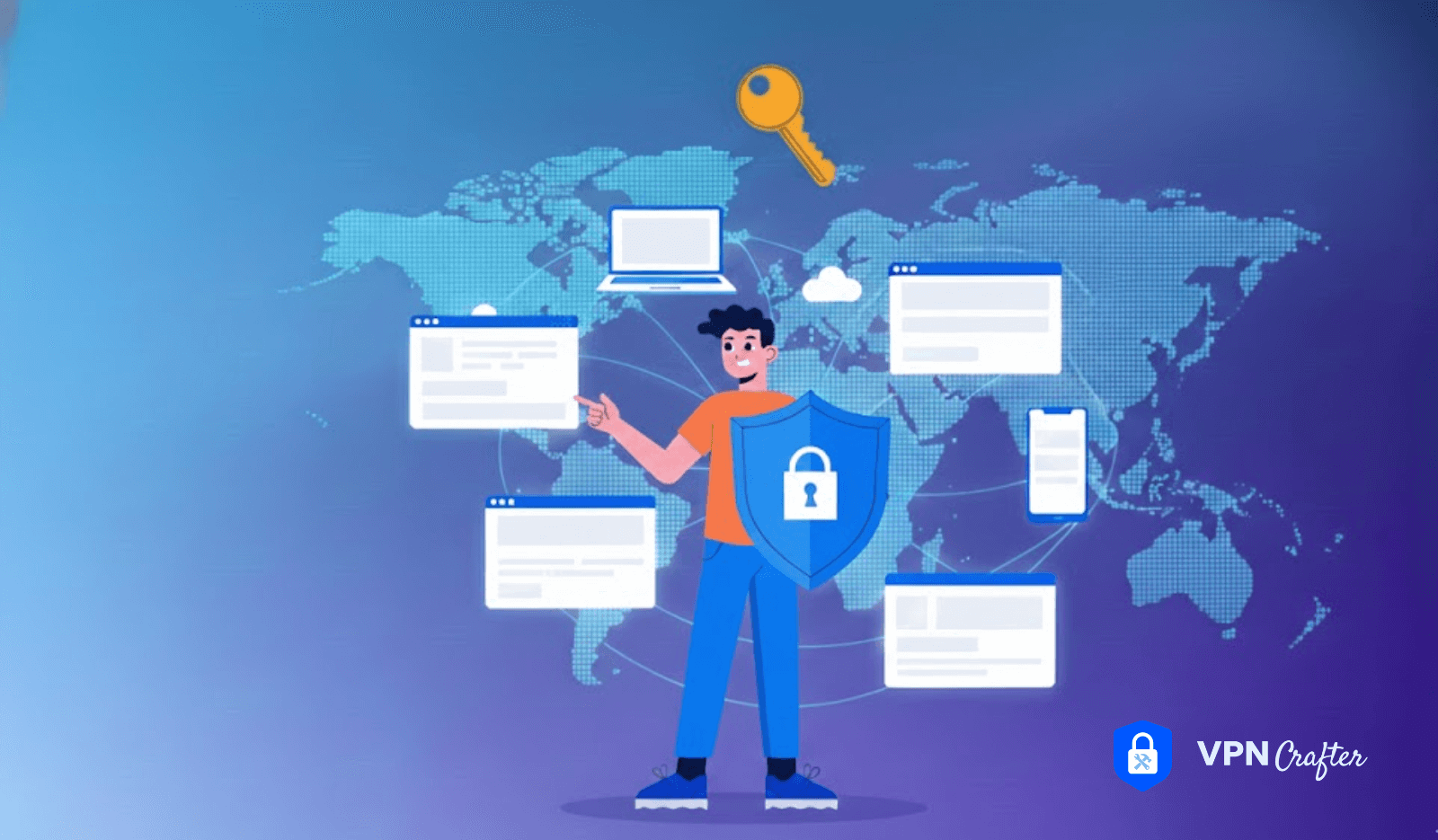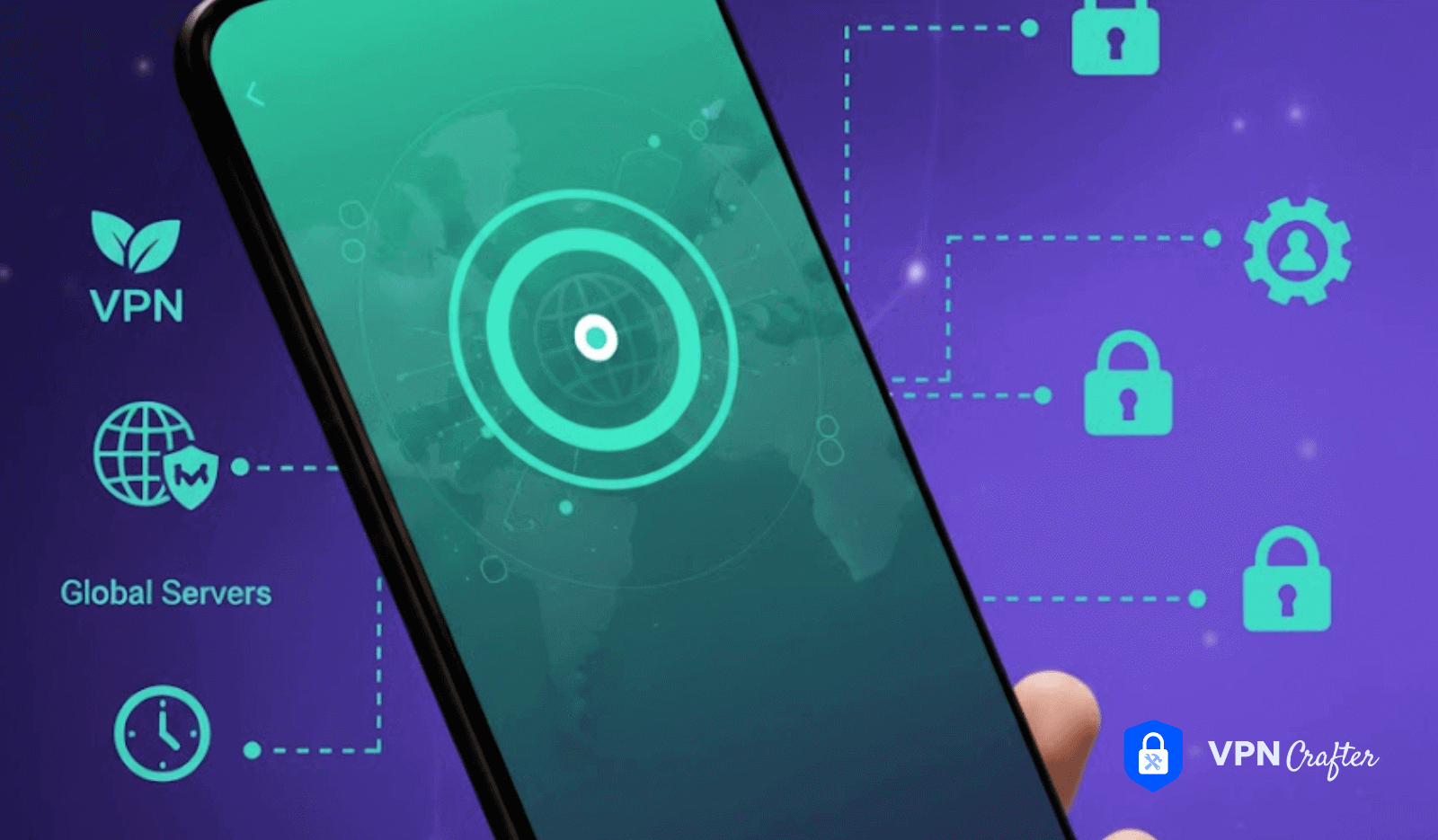Are you confused about VPN vs Proxy?
You’re online. All the time, probably. We all are. Checking stuff. Scrolling. Watching. Sending messages. It’s just part of life now.
And then you start hearing about things. “Privacy.” “Security.” “Who’s watching?”
It makes you think, right? Like, am I just out in the open? Is my stuff safe?
Then two words pop up: VPN. Proxy.
They sound… similar. Like they do the same job. You know? But they don’t. Not really. It’s a common mix-up. And it’s not your fault. The tech world throws these words around like everyone just gets it. Most people don’t.
But this matters. It’s about your own online life. Your stuff. Your peace of mind. So let’s just sort it out. Simply.
First, the VPN. What is it?
VPN stands for Virtual Private Network. Okay, big words. Forget them.
Just think of it this way: You’ve got your computer. Or your phone. You want to go online. Normally, your internet company, your ISP, they see everything you do. Every site. Every click. They see it all. They know.
A VPN? It’s like building a personal, secret tunnel. For all your internet stuff. Right from your device.
You turn on the VPN. And your device makes a connection to a VPN server. That server could be anywhere. Could be down the street. Could be across the world.
Now, here’s the key part: that connection, from your device to the VPN server? It’s encrypted.
What does “encrypted” mean? It means scrambled. Like, turned into gibberish. Only your device and that VPN server have the key to unscramble it.
So, if someone tries to look at your internet traffic while it’s going through this tunnel? They just see nonsense. Your internet company? They see you’re connected to the VPN server. That’s it. They don’t see what you’re doing inside the tunnel. They don’t know which websites you’re visiting. They don’t know what you’re typing. That’s pretty cool, if you ask me. Makes things feel a lot safer.
And another thing: your IP address. That’s like your internet home address. When you use a VPN, websites you visit don’t see your IP address. They see the IP address of the VPN server. So, they think you’re located wherever that server is. This is how people sometimes get around blocks. Like, if a show is only available in one country, you can pick a VPN server in that country. Then, the streaming service thinks you’re there.
The big deal with a VPN is that it usually covers everything on your device. All internet traffic. Your web browser, your email app, your messaging apps, even stuff running in the background. It all goes through that secure tunnel. It’s a whole-device protection thing.
Why would you want that?
- Privacy: This is a huge one. Your internet provider tracks you. So do lots of other companies. They build profiles on you. A VPN makes that way, way harder. Your online life becomes more private. It’s like, your business stays your business. That’s a good feeling, right?
- Security: Public Wi-Fi. We all use it. Coffee shops. Airports. Hotels. Free Wi-Fi. Sounds great. But those networks can be risky. Like, really risky. Hackers can sit on them. They can try to snatch your info. Your banking details. Your passwords. But with a VPN? Your connection is encrypted. Even if a hacker is on the same public Wi-Fi, they just see scrambled data. It’s like putting a locked door on your personal data. That’s a smart move.
- Access: You know how some streaming services block shows based on where you are? Or is a new game server only open in certain places? A VPN can help. You pick a server in a country where the content is available. And boom. You can often get right in. It opens up parts of the internet that were closed off before. It’s not a guarantee every single time, but it often works.
So, a VPN. It’s about serious privacy. Serious security. And opening up your online world. Makes sense, doesn’t it?
Now, about the Proxy. What’s that?
A proxy server. It’s also a middleman. But a different kind.
Imagine you want to visit a website. With a proxy, your request doesn’t go straight from your computer to the website. It goes to the proxy server first. The proxy server then goes to your website. And the website sees the proxy’s IP address. Not yours.
So, okay, it hides your IP address from the website. That’s one thing it does.
But here’s the major, major difference: most proxy servers don’t encrypt your internet traffic. That’s a big deal.
What does it mean? Does it mean your internet company? They still see what you’re doing. They see you’re connected to the proxy. And they see all the data you’re sending through it. It’s not scrambled. It’s out in the open.
Think about it this way: You ask a friend to deliver a message for you. That friend goes to the person. So, the person doesn’t see you. But if you shout the message across the room to your friend? Everyone else in the room hears it too. That’s a proxy. Your message isn’t private.
And a proxy typically covers just one thing. You set it up in your web browser, maybe. Or for one specific app. It doesn’t protect all the internet traffic from your whole device. So, your email app, your banking app, other stuff? Still using your normal, open internet connection. It’s like putting a small shield on just your arm, not your whole body.
Why would people use a proxy then?
- Basic IP Hiding: If you just need to hide your IP address from a website for a quick second. Like, you just want to see if a product is cheaper in a different country. No personal info involved.
- Simple Unblocking: Sometimes, a school or work network has a super simple block on a website. A proxy might get around that. For basic stuff, not anything secure.
- Quick Check: It’s often used for very casual browsing. Just a quick peek.
A proxy has its uses. For quick, non-sensitive stuff. But you really need to know what it doesn’t do.
Okay, so VPN vs. Proxy: Let’s Really Compare
This is where it gets clear. These are the main differences.
1. Security and Encryption
- VPN: This is its core. It encrypts everything. All your data, from your device to the VPN server, is locked down. Scrambled. No one can easily read it. This is huge for protecting sensitive info. Like banking logins. Or private messages. It’s a real shield. A secure channel.
- Proxy: Most proxies? No encryption. Your data is out in the open. Your internet company can see it. Anyone else watching that connection could see it too. Your IP address might be hidden from the website, but your actual activity isn’t private. Big difference. If you’re doing anything that matters, a proxy probably isn’t enough.
2. What They Cover
- VPN: It’s a full-device thing. You turn it on, and almost all your internet traffic, from every app and program on your device, goes through that encrypted tunnel. It’s comprehensive protection. From your browser to your games to your email client.
- Proxy: It’s usually just for one thing. You set it up in your web browser. Or maybe one specific app. Traffic from other apps on your device still goes over your regular, unsecured internet connection. It’s targeted. Not a full cover.
3. Speed and How Reliable They Are
- VPN: A good, paid VPN aims for speed. They have fast servers. They work hard to keep your connection stable. Yes, routing through another server adds a tiny bit of time, but with a good VPN, you barely notice it for most stuff. You get pretty consistent performance.
- Proxy: Free proxies? Often a mess. They’re usually overloaded with too many users. That means they’re slow. Really slow. Pages take forever to load. Videos buffer. They crash a lot. You can’t rely on them. It’s frustrating. Imagine trying to watch something and it just keeps stopping. Or playing a game and lagging out. Not fun.
4. The Cost. And the Catch.
- VPN: Good VPNs cost money. You pay a subscription. This covers their huge server networks, their strong encryption, their software, and their customer support. You’re paying for a service you can trust. It’s an investment in your peace of mind and your online safety.
- Proxy: Lots of proxies are “free.” But think about that. Running a server costs money. So if it’s free to you, someone else is paying. How? Maybe by showing you ads. Or, worse, by collecting and selling your data. Or by using your computer’s resources. When something is free online, you often become the product. You just don’t know who’s behind that “free” proxy or what their actual business is. That’s a huge risk.
5. Logging: Who’s Keeping Records?
- VPN: Reputable VPNs often have a “no-log” policy. This means they promise not to record what you do online. It’s a big deal for privacy. You want to pick a VPN that’s been audited by outside groups for this.
- Proxy: Free proxies? Forget it. Most don’t say anything about logging. You have to assume they are logging your activity. And they might sell that data. You have no idea. You have no control.
It comes down to this: how much do you trust the service? And how much do you care about what you’re doing online?
So, When Do You Use What? Real Talk.
This is the practical part. How do you decide? It’s not about one being just “better.” It’s about what you need it for.
You should definitely get a VPN if:
- You use public Wi-Fi. A lot. And you do anything important on it. Like checking your bank. Or logging into your email. Or working. Public Wi-Fi is wide open. A VPN is your shield. It’s really, really important here.
- Your online privacy is a big deal to you. You just don’t like the idea of your internet company knowing every site you visit. Or companies tracking your every move to sell you stuff. A VPN keeps your online life private. It’s about feeling truly anonymous.
- You need strong security. Beyond just privacy. If you worry about hackers. Or just want to add a serious layer of protection to your connection. A VPN does this.
- You want to watch shows or play games that are blocked where you are. And you want it to work consistently. Sometimes a TV show is only on a service in a different country. Or a game server is better in Europe. A VPN lets you connect there. It usually works smoothly. No buffering. No lagging out of your game. It gives you reliable access.
- You work from home and deal with important, secret company stuff. You need that secure connection from your house to your work network. A VPN creates that. It’s how professionals keep things safe.
Think about it. That feeling of relief when you’re logging into your bank on a hotel Wi-Fi, knowing your VPN is on. That’s what a VPN gives you.
You might, maybe, use a Proxy if:
- You just need to quickly hide your IP address for something that doesn’t matter. Like you want to see if an online store shows different prices if you appear to be in another state or country. You’re not logging in. You’re not sharing personal info. It’s a very quick, one-off check.
- You’re trying to get past a super simple block. Like a school network that blocks a specific website. If it’s not for anything sensitive, and you’re okay with it being slow.
- You’re okay with less security. A lot less security. This is key. If your online activity is something you absolutely do not care about being public. Then maybe. But that’s rare, right?
Honestly, for most people, a proxy is just not enough. The risks often outweigh the very limited benefits. You wouldn’t use a paper shield in a sword fight.
Final Thoughts: Your Internet, Your Choices
So, that’s the deal with VPNs and proxies. They seem similar, but they’re really built for different things.
A VPN? That’s your serious tool. For privacy. For security. For opening up the internet. It’s a comprehensive shield. It costs money, but for what you get, many people feel it’s worth it. It gives you peace of mind.
A proxy? That’s a quick, simple trick. For hiding your IP address from one website. For bypassing a super weak block. But it offers almost no security or privacy. And the free ones? Often unreliable and risky.
It’s all about what you need. What feels right for you. Take a minute. Think about how you use the internet every day. What are your worries? What do you want to achieve?
The internet isn’t going anywhere. It’s always changing. And having the right tools and knowing how to use them really matters. It puts you in control. And that’s a good thing. Your online life is yours. Protect it.
